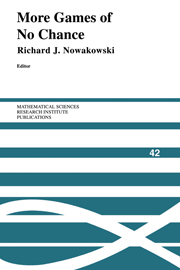
-
Select format
-
- Publisher:
- Cambridge University Press
- Publication date:
- May 2025
- November 2002
- ISBN:
- 9781316135167
- 9780521808323
- 9780521155632
- Dimensions:
- (234 x 156 mm)
- Weight & Pages:
- 0.887kg, 548 Pages
- Dimensions:
- (234 x 156 mm)
- Weight & Pages:
- 0.76kg, 548 Pages
You may already have access via personal or institutional login
Book description
This 2003 book provides an analysis of combinatorial games - games not involving chance or hidden information. It contains a fascinating collection of articles by some well-known names in the field, such as Elwyn Berlekamp and John Conway, plus other researchers in mathematics and computer science, together with some top game players. The articles run the gamut from theoretical approaches (infinite games, generalizations of game values, 2-player cellular automata, Alpha-Beta pruning under partial orders) to other games (Amazons, Chomp, Dot-and-Boxes, Go, Chess, Hex). Many of these advances reflect the interplay of the computer science and the mathematics. The book ends with a bibliography by A. Fraenkel and a list of combinatorial game theory problems by R. K. Guy. Like its predecessor, Games of No Chance, this should be on the shelf of all serious combinatorial games enthusiasts.
Reviews
"Combinatorial games provide the teacher with a creative means to allow students to explore mathematical ideas and develop problem-solving skills. While the rules are simple, there are rich mathematical theories underlying these games. Students are puzzled at first, and seem to make random moves. By encouraging them to start with simple games with a small number of pieces and then gradually increase the complexity, students are able to formulate and test their own theories for strategic solutions."
S. Wali Abdi, School Science and Mathematics
Contents
Metrics
Altmetric attention score
Full text views
Full text views help Loading metrics...
Loading metrics...
* Views captured on Cambridge Core between #date#. This data will be updated every 24 hours.
Usage data cannot currently be displayed.
Accessibility standard: Unknown
Why this information is here
This section outlines the accessibility features of this content - including support for screen readers, full keyboard navigation and high-contrast display options. This may not be relevant for you.
Accessibility Information
Accessibility compliance for the PDF of this book is currently unknown and may be updated in the future.


